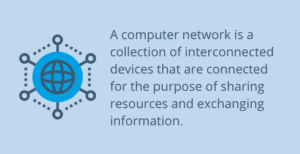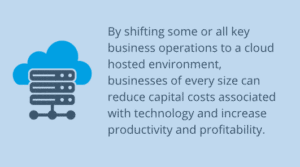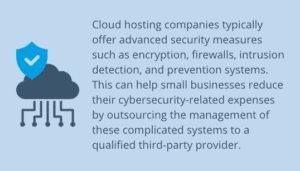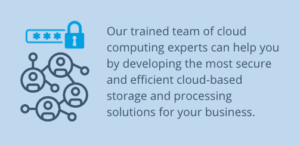Small businesses tend to use simple LANs, midsize and enterprise businesses use a combination of LANs and WANs. Businesses of all sizes can benefit from a shift to cloud services.
What is a Computer Network?
 A computer network is a collection of interconnected devices that are connected for the purpose of sharing resources and exchanging information.
A computer network is a collection of interconnected devices that are connected for the purpose of sharing resources and exchanging information.
These networks can take many different forms, from small peer-to-peer networks in a small office, to large global networks such as the Internet.
They also use a variety of protocols – like IP and Ethernet – to control the flow of information between devices and to provide access to shared resources.
How are Different Types of Computer Networks Used By Businesses?
For small businesses, the most common network is a Local Area Network (LAN).
A LAN is a simple network that connects devices in a small geographic area. They are typically used to share files and printers. They allow multiple users to access the Internet. The router, or switch, provides the connection to the Internet for the network and acts as a firewall to protect against external threats.
Mid-Sized businesses typically rely on a combination of LANs and a Wide Area Network (WAN).
The primary difference between a LAN and a WAN is that a WAN typically isn’t used to link together individual computers. Instead, a WAN is a network that connects multiple LANs together.
WANs are often used by businesses and organizations to connect various locations to share information and resources.
Larger companies may also have a higher number of employees and require more advanced security measures and access controls.
A WAN can be connected through:
• dedicated communication lines (leased lines)
• VPNs
• broadband internet connection
Enterprise businesses use a combination of LANs, WANs, and cloud services as the architecture for their computer network.
Enterprise businesses can have multiple locations and a larger workforce. This requires a more advanced and robust network infrastructure.
 They may have a high volume of data or business applications that require advanced storage and backup solutions. These companies often rely on virtualization technologies to separate network resources and improve scalability and efficiency.
They may have a high volume of data or business applications that require advanced storage and backup solutions. These companies often rely on virtualization technologies to separate network resources and improve scalability and efficiency.
Additionally, they may use cloud services to provide additional processing resources, security, and support.
The type of computer network used by a business depends on the size of the business, the number of locations and employees, and the specific business needs.
By shifting some or all key business operations to a cloud hosted environment, businesses of every size can reduce capital costs associated with technology and increase productivity and profitability.
Small Business Benefits from a Cloud-Hosted Solution
 Small businesses often have limited technology budgets and computing resources. A cloud-hosted solution can help reduce the overhead associated with buying new hardware, system maintenance, and payroll costs for IT support staff.
Small businesses often have limited technology budgets and computing resources. A cloud-hosted solution can help reduce the overhead associated with buying new hardware, system maintenance, and payroll costs for IT support staff.
Cloud accessed resources can be easily scaled up or down as needed, allowing small businesses the flexibility to pay only for the resources they need at a given time. This can help control escalating costs and potential downtime associated with over-provisioning or under-provisioning their network resources.
Cloud services can be accessed from anywhere, at any time, which allows small businesses to be more responsive to changing business needs. This increased flexibility can help reduce costs associated with diminished workforce productivity.
Cloud hosting companies typically offer advanced security measures such as encryption, firewalls, intrusion detection, and prevention systems. This can help small businesses reduce their cybersecurity-related expenses by outsourcing the management of these complicated systems to a qualified third-party provider.
 Cloud vendors typically offer robust disaster recovery solutions, which can help small businesses recover quickly from a disaster. Disaster recovery protocols and redundant data centers can also minimize the costs associated with lost data or system downtime.
Cloud vendors typically offer robust disaster recovery solutions, which can help small businesses recover quickly from a disaster. Disaster recovery protocols and redundant data centers can also minimize the costs associated with lost data or system downtime.
Need help making your network more robust, increasing business productivity, or capping escalating technology costs?
Our trained team of cloud computing experts can help you by developing the most secure and efficient cloud-based storage and processing solutions for your business.
Let us demonstrate exactly what Cyberlink can do for you – using your own data and workflows.

